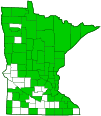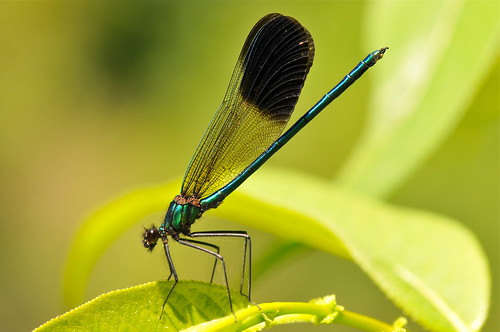river jewelwing
(Calopteryx aequabilis)
Conservation • Description • Habitat • Ecology • Distribution • Taxonomy
|
|
||||||||||||||
Description |
River jewelwing is a large, 1¼″ to 2⅛″ long, showy, broad-winged damselfly. It is common in northern United States and southern Canada. Males and females are the same size. The head, thorax, and upper (dorsal) and side (lateral) surfaces of the abdomen of the male are iridescent. The apparent color is determined by the quantity and angle of available light. In good light they appear brilliant metallic green or bright metallic teal blue depending on the angle of the light. In deep shade they appear black. The 8th and 9th abdominal segments have a narrow, white, lateral patch. The lower (ventral) surface of the abdomen is black. The wings are 1″ to 1 7 ⁄16″ long and are broad, 3½ to 4 times as long as wide. On mature individuals they are pale smoky brown, almost clear, at the base with a dark brown band at the tip. The band on the hindwing is about one third the length of the wing. That of the forewing is narrower, about one fourth the length of the wing. The wings are not stalked at the base. The area between the base of the wing and the notch (nodus) is crossed by numerous veins. The legs are long, slender, and dark. The female is similar but less brilliantly colored. It may appear bronze, gray, or black with a slight bluish-green iridescence. The 8th and 9th abdominal segments have a brown lateral patch. The wings are darker, yellowish-brown near the body, dark brown on the outer third, usually appearing banded at the tip. There is a slender white area (pseudopterostigma) on the leading edge of each wing toward the tip. It is crossed by veins so is not a true pterostigma. It is less than half as wide as long. |
Size |
Total length: 1¾″ to 2⅛″ |
Similar Species |
Ebony jewelwing (Calopteryx maculata) wings are broader, 3 times as long as wide. On the male they are entirely black, not banded. On the female they are darker, dark gray near the body becoming almost black at the tip, and not appearing banded. The pseudopterostigma is broader. |
Habitat |
Clear, moderately flowing streams of any size with at least some open canopy; small and medium-sized rivers. |
Ecology |
Season |
Late May to early September |
Behavior |
Adults often perch head down on vegetation near water. When perched the wings are held back vertically above the body. |
Life Cycle |
After mating the female oviposits eggs inside soft, submerged stems of aquatic plants up to a foot below the surface of the water. Naiads remain in the water for two or three years, molting 12 or 13 times before emerging as an adult. Adults emerge mostly in June. They reach sexual maturity in about 11 days and live on average for 16 to 20 days. |
Naiad Food |
Small insects and other arthropods |
Adult Food |
Small insects and other arthropods |
Distribution |
||
|
Sources Biodiversity occurrence data published by: Minnesota Biodiversity Atlas (accessed through the Minnesota Biodiversity Atlas Portal, bellatlas.umn.edu, 8/2/2025). Haarstad, J. 1997. The dragonflies of selected eastern Minnesota rivers. Report submitted to the Minnesota Department of Natural Resources. Unpaged. Steffens, W. P., and W. A. Smith. 1999. Status survey for special concern and endangered dragonflies of Minnesota: population status, inventory and monitoring recommendations. Final report submitted to the Natural Heritage and Nongame Research Program, Minnesota Department of Natural Resources. 54 pp. |
|
| 8/10/2025 | ||
Occurrence |
||
Common |
||
Taxonomy |
|
Order |
Odonata (Dragonflies and Damselflies) |
Suborder |
|
Superfamily |
Calopterygoidea |
Family |
Calopterygidae (broad-winged damselflies) |
Genus |
Calopteryx (jewelwings) |
Subordinate Taxa |
|
|
|
Synonyms |
|
Agrion aequabile Agrion aequabile californicum Agrion aequabile coloradicum Agrion coloradicum Calopteryx aequabilis yakima Calopteryx hudsonica Calopteryx virginica |
|
Common Names |
|
river jewelwing |
|
Glossary
Nodus
On dragonflies and damselflies: the small notch on the lead edge of each wing about halfway between the body and the tip.
Pseudopterostigma
In Calopterygidae, a pale spot containing numerous cells at the leading edge of each wing toward the tip. It is crossed by veins and therefore is not a true pterostigma.
Pterostigma
[= stigma] In Odonata and Hymenoptera, a blood-filled blister or dark spot at the leading edge of each wing toward the tip. It is heaver than adjacent, similar sized areas and is thought to dampen wing vibrations and signal mates.
Visitor Photos |
||
Share your photo of this insect. |
||
This button not working for you? |
||
Dan W. Andree |
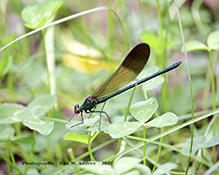 |
Adult Male |
MinnesotaSeasons.com Photos |
||
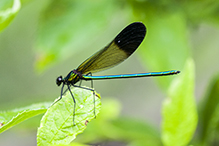 |
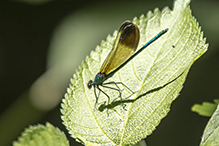 |

Visitor Videos |
||
Share your video of this insect. |
||
This button not working for you? |
||
|
Other Videos |
||
River Jewelwing Damselfly (Calopterygidae: Calopteryx aequabilis) Male |
About
Published on Jun 13, 2012 Photographed at the Turtle River State Park, North Dakota (12 June 2012). |
River Jewelwing Damselfly (Calopterygidae: Calopteryx aequabilis) Male on Leaf |
About
Published on Jul 9, 2011 Photographed at the Turtle River State Park, North Dakota (08 July 2011). |
River Jewelwing (Calopteryx aequabilis) Damselfly |
About
Published on Jan 8, 2015 |
River Jewelwings on the Marys River |
About
Published on Jul 4, 2013 These large damselflies are common along rivers and some creeks but seldom seen elsewhere. |

Visitor Sightings |
||
Report a sighting of this insect. |
||
This button not working for you? |
||
| Dan W. Andree June 2017 |
Location: Norman Co. Mn. I came upon this adult male - River Jewelwing while out in an area near a small stream |
 |
MinnesotaSeasons.com Sightings |
||

Created: 3/10/2018 Last Updated: © MinnesotaSeasons.com. All rights reserved. |
